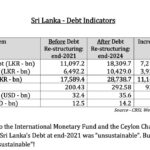Donald Trump has won the 2024 U.S. presidency, here’s how his administration could directly impact Sri Lanka’s geopolitical landscape, economic stability, and diplomatic relations over the coming years:
1. Geopolitical Tensions and China Relations
- Intensified U.S.-China Rivalry in the Indian Ocean: Trump’s previous stance on China suggests he would pursue a similarly aggressive approach, increasing the U.S. presence in South Asia to counter Chinese influence. Sri Lanka, strategically located in the Indian Ocean and a key point in China’s Belt and Road Initiative (BRI), would likely face pressure to reduce its dependence on Chinese infrastructure investments.
- Potential Diplomatic Balancing Act for Sri Lanka: The Trump administration may urge Sri Lanka to partner more closely with the U.S. or allies like India, possibly restricting Chinese-backed projects in key sectors like ports and logistics. This could put Sri Lanka in a challenging diplomatic position, needing to balance both Chinese investment and U.S. strategic demands.
2. Economic and Trade Policy Shifts
- Stringent Trade Terms and Reduced Privileges: Trump’s “America First” agenda may lead to a review of trade privileges, with a focus on reducing trade deficits and favoring U.S. businesses. Sri Lanka could see its access to the U.S. market adjusted, including the potential loss of any favorable tariff schemes. Such restrictions would impact Sri Lankan exports, particularly textiles and apparel, which are key industries for the local economy.
- Stronger Dollar, Higher Debt Burden: Trump’s economic policies could strengthen the U.S. dollar, increasing the value of Sri Lanka’s dollar-denominated debt. This would strain Sri Lanka’s debt management as it attempts to stabilize foreign exchange reserves and meet international repayment obligations, risking greater financial vulnerability.
3. Reduction in U.S. Foreign Aid and Development Programs
- Lower Foreign Aid Budgets: Trump has historically advocated reducing U.S. foreign aid, which could impact any aid programs currently supporting development and humanitarian efforts in Sri Lanka. This could particularly affect social, economic, and environmental projects funded by the U.S., limiting resources for education, health, and infrastructure in rural regions.
- Focus on Private Sector Investment: Instead of direct aid, the Trump administration may encourage American companies to invest in Sri Lanka, especially in sectors that counterbalance Chinese influence, such as energy or technology. However, for Sri Lanka to attract American firms, it may need to provide regulatory reforms and incentives to create a more favorable investment climate.
4. Shifts in Human Rights and Democratic Reforms
- Reduced Pressure on Human Rights Issues: Under Trump’s previous leadership, U.S. foreign policy placed less emphasis on human rights. This could mean reduced U.S. advocacy for human rights reforms or ethnic reconciliation efforts in Sri Lanka. With less international pressure, Sri Lanka’s government may adopt a more flexible approach to addressing internal matters, although this may attract criticism from other international bodies.
- Support for Security and Anti-Terrorism: Trump is likely to focus on counterterrorism and regional security to protect U.S. interests in the Indian Ocean. Sri Lanka may receive increased security support, including intelligence sharing, training, and military aid, bolstering its maritime defenses. This aligns with U.S. interests in maintaining open sea lanes and curbing potential threats in a strategic location.
5. Stronger U.S.-India Relations Affecting Sri Lanka
- Influence from a U.S.-India Partnership: Trump had established strong relations with India, a dynamic that could extend to his 2024 term. This partnership could create opportunities for Sri Lanka to collaborate in areas like infrastructure and trade but might also place limits on its autonomy, as India might push Sri Lanka to avoid Chinese deals. Sri Lanka would need to align with certain regional security and economic policies to foster cooperative relations with both India and the U.S.
Overall Impact on Sri Lanka’s Future
Under Trump’s presidency, Sri Lanka might face economic pressures from stringent U.S. trade policies and a stronger dollar, making debt repayment more challenging. At the same time, the U.S. push to counter Chinese influence could lead to diplomatic strain, especially if American expectations clash with Sri Lanka’s reliance on Chinese investment. On the other hand, increased U.S.-India cooperation could bring opportunities for strategic partnerships in areas like infrastructure and security, provided Sri Lanka navigates its role in regional geopolitics carefully.
In this scenario, Sri Lanka would likely aim to diversify its diplomatic and trade relationships to mitigate risks from over-dependence on either China or the U.S., maintaining its autonomy in an increasingly polarized global environment..















